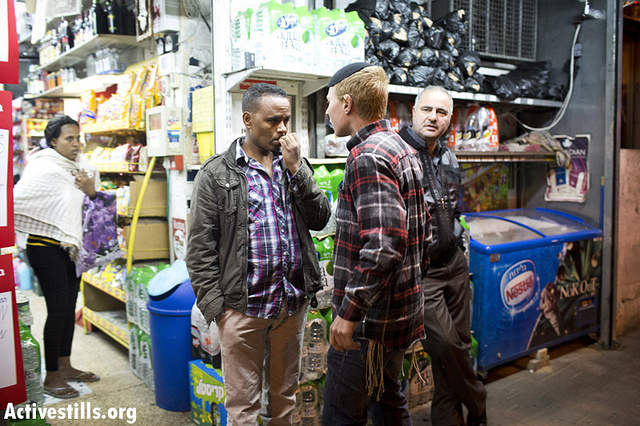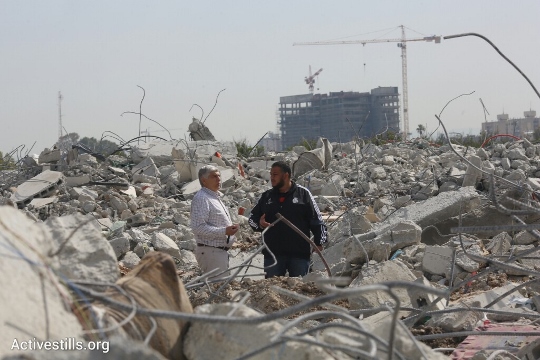From asylum seekers to Palestinians to Holocaust survivors, the lack of compassion is appallingly evident in the way Israeli society treats the disadvantaged.

In 1904, H.G. Wells published a short story entitled “The Country of the Blind.” It tells of a mountaineer whose failed attempt to climb a summit in Ecuador leads him to slide down into a valley cut off from the rest the world. The inhabitants of the valley are descendants of settlers who fled the Spanish conquests and found themselves stuck there after an earthquake. They managed to build a functioning society, despite the fact that the community was afflicted early on by a disease that caused all babies to be born blind.
In time, the inhabitants of the valley adjusted to life without sight, and when the mountaineer arrives hundreds of years later, they have no concept of what vision is, or that there is even such a thing as a fifth sense. The mountaineer’s attempts to explain sight to the villagers is futile; they believe it is simply his imagination. Eventually, the mountaineer resigns himself to the community’s way of life.
Well’s story forms a useful allegory when considering the kind of society we have built in Israel. Except, of course, that the critical faculty that has been bred out of us is compassion, rather than sight. In a recent piece for Haaretz, Professor Eva Illouz wrote of “the demise of Israeli compassion.” Drawing on her experiences of the death of her father in an Israeli hospital, Illouz illustrates what has led to the relentless militarization of Israeli society. “The permanent colonizing of the land that required making the army central to society, is what shaped the politics of the gaze, who we see and how we see,” Illouz explains.
In turn, Israeli militarism makes us unable to “see” others — that is, unable to recognize them as human, and all that being human entails: vulnerability, sensibility and complexity.
Illouz further states that with militarization comes “the habit of domination” — the hardening of a collective attitude in which exerting power over the weaker elements of society becomes the norm. It unpicks our ability to see others as equal to us and, consequently, as deserving of equal treatment.
And indeed, in every direction one looks in Israel, the lack of compassion is appallingly evident in the way the disadvantaged are treated. Palestinians are alternately locked up in their own homes, and have their houses pulled down around them. Palestinian children languish in Israeli military prisons. Poor families are evicted and their houses demolished to make way for luxurious apartment blocks. Holocaust survivors live in abject poverty. Asylum seekers who have fled genocide, torture and persecution are detained indefinitely and/or deported to their deaths (even news of those deaths is greeted with glee). Families living below the breadline are eroded by a faceless, nightmarish excuse for a welfare system where apathy, not accountability, dictates the terms. And, as Illouz and others have experienced, even the sick fail to inspire compassion in those whose job is to care for them.

This is the behavior of a government and society with hardened hearts and unseeing eyes. It is a blindness that has, as in Wells’ story, struck Israeli society from day one. Even Ari Shavit, in his otherwise problematic book ‘My Promised Land,” manages to identify its starting point, when he admits that his great-grandfather — one of the early colonizers of the land — “does not see because he is motivated by the need not to see.” From this beginning, compassion has increasingly withered with each successive generation. We have now, as Illouz puts it, arrived at “a society that overall has become used to not blinking when destroying life.”
* * *
There is a closing section to Wells’ “The Country of the Blind.” Having fallen in love with a girl in the valley, the mountaineer is told he must have his eyes removed if he wants to marry her, as the village doctor believes they are affecting his brain. He consents, but decides to escape on the morning of the operation.
Following the election results, commentators asked whether Israel had already made its choice. Israeli society voted away from both democracy and compassion. The choice we face is less clear than that of the mountaineer; nonetheless, there is a definite fork in the road. Do we choose compassion, to “see” others? Or do we choose to remain blind, groping our way further into the darkness because we refuse to believe there is another way?


